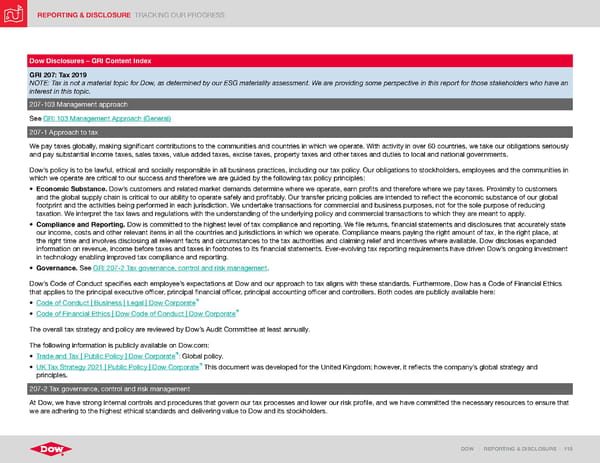REPORTING & DISCLOSURE TRACKING OUR PROGRESS DOW | REPORTING & DISCLOSURE | 118 Dow Disclosures – GRI Content Index GRI 207: Tax 2019 NOTE: Tax is not a material topic for Dow, as determined by our ESG materiality assessment. We are providing some perspective in this report for those stakeholders who have an interest in this topic. 207-103 Management approach See GRI 103 Management Approach (General) 207-1 Approach to tax We pay taxes globally, making significant contributions to the communities and countries in which we operate. With activity in over 60 countries, we take our obligations seriously and pay substantial income taxes, sales taxes, value added taxes, excise taxes, property taxes and other taxes and duties to local and national governments. Dow’s policy is to be lawful, ethical and socially responsible in all business practices, including our tax policy. Our obligations to stockholders, employees and the communities in which we operate are critical to our success and therefore we are guided by the following tax policy principles: • Economic Substance. Dow’s customers and related market demands determine where we operate, earn profits and therefore where we pay taxes. Proximity to customers and the global supply chain is critical to our ability to operate safely and profitably. Our transfer pricing policies are intended to reflect the economic substance of our global footprint and the activities being performed in each jurisdiction. We undertake transactions for commercial and business purposes, not for the sole purpose of reducing taxation. We interpret the tax laws and regulations with the understanding of the underlying policy and commercial transactions to which they are meant to apply. • Compliance and Reporting. Dow is committed to the highest level of tax compliance and reporting. We file returns, financial statements and disclosures that accurately state our income, costs and other relevant items in all the countries and jurisdictions in which we operate. Compliance means paying the right amount of tax, in the right place, at the right time and involves disclosing all relevant facts and circumstances to the tax authorities and claiming relief and incentives where available. Dow discloses expanded information on revenue, income before taxes and taxes in footnotes to its financial statements. Ever-evolving tax reporting requirements have driven Dow’s ongoing investment in technology enabling improved tax compliance and reporting. • Governance. See GRI 207-2 Tax governance, control and risk management . Dow’s Code of Conduct specifies each employee’s expectations at Dow and our approach to tax aligns with these standards. Furthermore, Dow has a Code of Financial Ethics that applies to the principal executive officer, principal financial officer, principal accounting officer and controllers. Both codes are publicly available here: • Code of Conduct | Business | Legal | Dow Corporate • Code of Financial Ethics | Dow Code of Conduct | Dow Corporate The overall tax strategy and policy are reviewed by Dow’s Audit Committee at least annually. The following information is publicly available on Dow.com: • Trade and Tax | Public Policy | Dow Corporate : Global policy. • UK Tax Strategy 2021 | Public Policy | Dow Corporate This document was developed for the United Kingdom; however, it reflects the company’s global strategy and principles. 207-2 Tax governance, control and risk management At Dow, we have strong internal controls and procedures that govern our tax processes and lower our risk profile, and we have committed the necessary resources to ensure that we are adhering to the highest ethical standards and delivering value to Dow and its stockholders.
 ESG Report | Dow Page 117 Page 119
ESG Report | Dow Page 117 Page 119